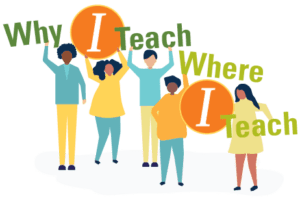Why I Teach, Where I Teach: So My Students Have the Opportunity to Define Themselves
We are all aware of the trite — yet true — expression that “education is freedom.” So, how apropos is it that I am an educator at a school called Freedom? Despite the providence that may have guided me here, the path to a career in education has been anything but a planned one.
From an early age, I knew that I wanted to pursue a noble profession. Often, the elders of my community would ask: “Do you want to be a doctor or a lawyer?” Because I could not imagine basking in the gore of blood and other bodily fluids, I chose the path more heavily traveled. With a juris doctorate in hand, I set out to make my mark on the world.
Despite that degree (and the many years it took to acquire it), I soon realized that that mark would not be in law. It was not my passion, so I sought to trade the idea of the courtroom with the reality of the classroom. I sought to rename myself — teacher. Unease quickly set in at the thought of not conforming to the image that others had of me: imposter, deceiver, inadequate, worthless… these, and other like words, reverberated off the walls of my mind (and sometimes off the walls of rooms inhabited by those I once called friends).
However, the doubt did not shake me. I would not be moved. Today, I teach language and literacy in a small school district in Tennessee, where approximately 48% of my classroom population are students of color — and 100% are the future leaders of America. One of our recent literacy units focused on identity and how the past and our present may shape our future. While analyzing our former First Lady Michelle Obama’s commencement address, we were struck by a specific sentiment. My scholars noticed that Mrs. Obama’s ancestors abnegated the labels others attached to them — enslaved, servant, property — and sought to define their own futures. As a result, their children, grandchildren, and great-grandchildren were able to “wake up each morning in the White House.”
Inspired by this idea, my students identified a negative quality assigned to them by society and replaced it with a positive one: stubborn became determined, talkative became articulate, and disrespectful became bold. The list continued on and on. And as I overhear my students renaming themselves on a daily basis, I know my cause to be a noble one. I teach so that my students can bear witness to this story — so that they know that they need not be conformed to any word, idea, or image. They are free to create their own.
Priscilla Conerly is a current teacher at Franklin Special School District, and is part of the Tennessee Educators of Color Alliance
